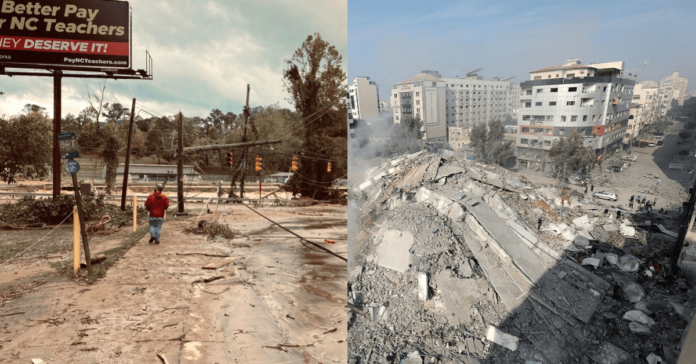Featured photo: Left: Asheville resident Bill McMannis took this photo on Sept. 27 the day after Hurricane Helene. (photo by Bill McMannis) Right: Palestinians inspect the ruins of Watan Tower destroyed in Israeli airstrikes in Gaza city, on October 8, 2023. (photo by Palestinian News & Information Agency (Wafa) in contract with APAimages, CC BY-SA 3.0 https://creativecommons.org/licenses/by-sa/3.0, via Wikimedia Commons)
When the disastrous effects of Hurricane Helene were made clear earlier this week, the North Carolina community acted swiftly.
Hundreds of thousands of people across the state and beyond immediately moved to send supplies, donate funds and even travel to the mountains to offer a helping hand. In the wake of a horrible tragedy, the ways in which people have expanded their hearts for the people of western North Carolina has been nothing short of extraordinary.
And it makes sense. The infrastructure in that part of the state has been devastated. Water, electricity, internet. It’s all been obliterated and much of it won’t come back for the foreseeable future for so many parts of the region. And so people started buying water bottles in bulk to send. Breweries began canning water instead of beer. Entire shelves at grocery stores and retail shops remained empty this week, presumably because good-hearted people had bought them out to send to someone else, a stranger, in need.
And it’s been a beautiful thing to see.
But in the aftermath of Hurricane Helene and watching the way the community has so quickly mobilized to support those in western NC, I can’t help but be reminded of the fact that the people of Gaza continue to live without the same kind of infrastructure that’s been devastated here.
“Children are carrying water the weight of themselves back to their shelters,” said Louise Wateridge, a spokesperson for UNRWA, the United Nations agency for Palestinian refugees, in an article published by NBC in July. Wateridge added that the children often spend as much as six to eight hours trying to collect both food and water.
In the article, UNRWA estimated that almost 70 percent of water and sanitation facilities and infrastructure had been destroyed or damaged in Israel’s bombardment.
In a 2017 article, Amnesty International outlined the historical context.
“In November 1967 the Israeli authorities issued Military Order 158, which stated that Palestinians could not construct any new water installation without first obtaining a permit from the Israeli army,” the outlet reported. “Since then, the extraction of water from any new source or the development of any new water infrastructure would require permits from Israel, which are near impossible to obtain.”
Electricity and the internet are also hard to come by. And it didn’t just start last year.
According to the United Nations, that Gaza Strip has suffered from “a chronic electricity deficit” and as of this year, there is virtually no electricity in the area.
NPR reported in March how 80 percent of cell towers owned by one of two companies in Palestine had been destroyed. An employee of Paltel, one of the telecommunication companies, said that the problems predate the genocidal campaign by the Israeli military that began on Oct. 7. According to the source, running telecommunications for Palestinians is complicated by the Israeli government since it controls the borders of Palestinian territories, as well as imports and exports, making it difficult to bring in supplies.
Where is the outrage? Where is the support?
While American support for Palestine has increased slightly over the last year, the majority of the US adult population continues to support Israel and its act of dehumanizing violence. According to polling by YouGov released on Oct. 4 of this year, 35 percent of American adults supported Israel compared to just 17 percent who supported Palestinians. Twenty-five percent said they supported them equally while 23 percent said they weren’t sure. A recent AP poll reflects similar sentiments.
But what is the difference between a displaced western North Carolinian who has lost their home, all of their belongings, their way of life and a Palestinian whose circumstances are far more dire? Why does one get support so swiftly as opposed to another?
Make it make sense.
And remember, one is a direct result of climate change while the other is a direct result of American funds. American taxpayer funds. You and I’s funds.
So, in the words of Ta-Nehisi Coates, “either apartheid is right or it’s wrong. It’s really, really simple.”
Join the First Amendment Society, a membership that goes directly to funding TCB‘s newsroom.
We believe that reporting can save the world.
The TCB First Amendment Society recognizes the vital role of a free, unfettered press with a bundling of local experiences designed to build community, and unique engagements with our newsroom that will help you understand, and shape, local journalism’s critical role in uplifting the people in our cities.
All revenue goes directly into the newsroom as reporters’ salaries and freelance commissions.
